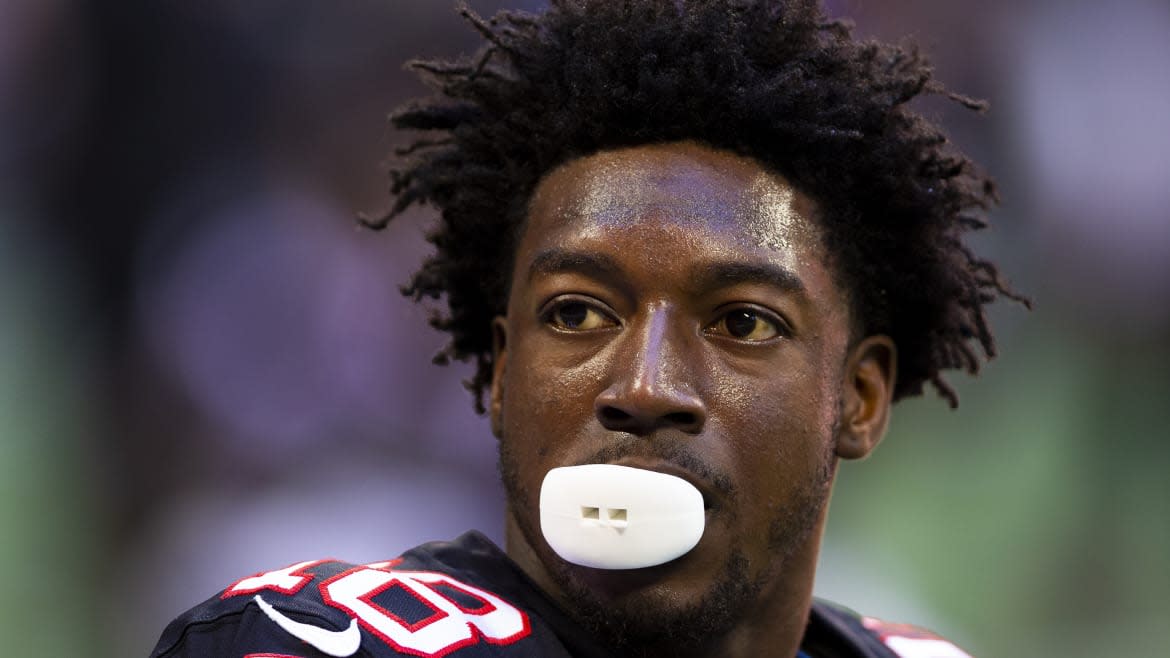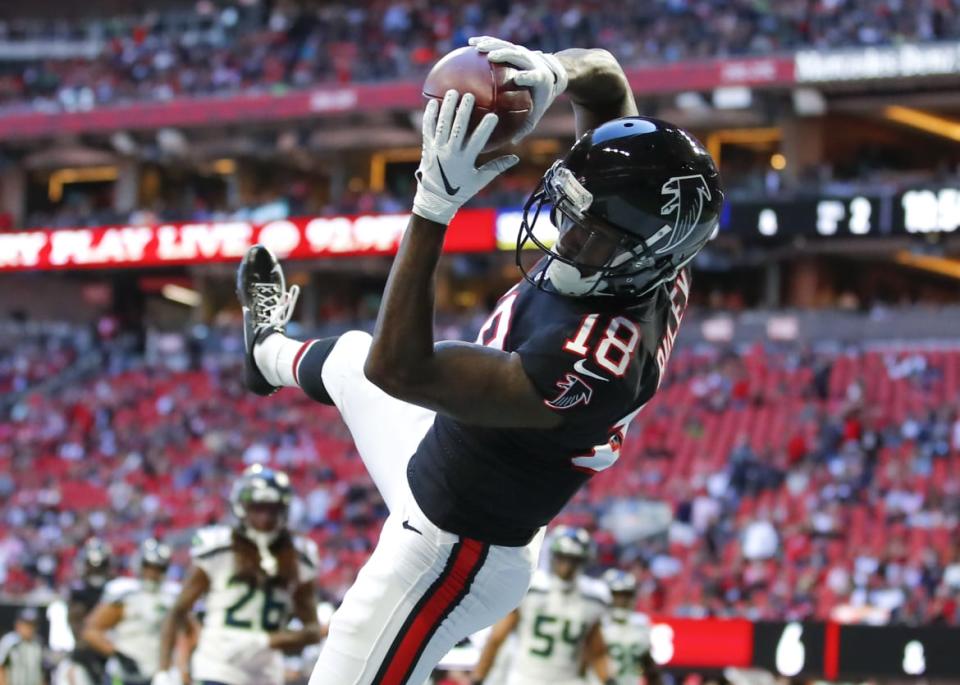NFL Star Calvin Ridley Got a 1-Year Ban for Gambling—More Than Abusers, COVID Liars, and the Patriots

- Oops!Something went wrong.Please try again later.
On Monday, Atlanta Falcons star wide receiver Calvin Ridley was suspended from the NFL for a whole year after the league found Ridley had been betting on NFL games. To be clear: Ridley was not betting on games he was playing in, was not being leveraged by any shady characters, and wasn’t even making bets while he was technically playing on Sundays; rather, he made his handful of bets while he was taking a short leave of absence from football to tend to his mental health, and was therefore unable to to do anything to affect the outcome of games.
The league said as much. NFL Commissioner Roger Goodell claimed that the team “uncovered no evidence indicating any inside information was used or that any game was compromised in any way… Nor was there evidence suggesting any awareness by coaches, staff, teammates, or other players of his betting activity.”
Tom Brady, Aggravatingly Unbeatable Void, Calls It a Day
Ridley didn’t go through a bookie or anything like that; he just sat on his phone one day, plugging some bets into the Hard Rock Sportsbook app like tons of people do every Sunday. Genius Sports, an NFL partner who operates Hard Rock’s betting app, said that they “alerted the NFL that a player might be behind those bets,” which seems, to me, like a euphemism for, “Saw that Ridley had an account on one of the books we operate, saw that he placed a bet on an NFL game, and told the NFL, who they also work for.”
Ridley has taken his suspension in stride, first tweeting a funnily-worded note that he doesn’t have a gambling problem:
I bet 1500 total I don’t have a gambling problem
— CALVIN RIDLEY (@CalvinRidley1) March 7, 2022
Then, a brief athlete-style brag about the season he will unleash after this is all over:
Just gone be more healthy when I come back
— CALVIN RIDLEY (@CalvinRidley1) March 7, 2022
And finally, a light complaint about the degree of punishment:
I know I was wrong But I’m getting 1 year lol
— CALVIN RIDLEY (@CalvinRidley1) March 7, 2022
And that’s pretty much it. No challenge, no denial. I broke the rules, I know it. Whoops.
Does this writer think that Ridley deserves to lose a year of his athletic prime for this? No. Does he think it’s faintly absurd that Ridley is getting exiled for a whole season when Aaron Rodgers received zero games for lying about his COVID vaccination status, Adrian Peterson got a few games for beating the shit out of his 4-year-old kid, Ray Rice initially got two games after being caught on tape brutally assaulting his girlfriend, and the Patriots were slapped on the wrist for a Nixon-level spying conspiracy? Yeah, for sure, he thinks it’s totally disproportionate. Six games at most. Maybe even a fine.
But this writer recognizes something else about all this: He is not the NFL, or any other sports league, and this zero-tolerance paranoia about athletes gambling on their own games, well, they came about it honestly.
Professional sports exist because of gambling. That’s not to say it’s the primary driver for their continued existence, but the origins of pro sports are entangled with placing wagers. In Baseball in the Garden of Eden, the canonical history of the early days of the game, John Thorn illustrates how baseball began its life as a scattershot boys’ game, a janky American offshoot of cricket with many regional variants, and became a more professional, standardized entity that attracted the attentions of adults, on account of the interest of gamblers. “Without gambling and the level of interest it aroused among spectators, and the spur it provided to professional play, baseball could not produce cultural heroes and might have never risen to the level of national pastime. That laurel could be granted not by the men who played the game, but only by those who watched it,” wrote Thorn.
The links are everywhere. The first major American celebrity-athlete was Dan Patch, a harness-racing champ who was so fast that they stopped allowing him to participate in normal races because betting on a race where Patch was running was completely pointless. Thorn digs up some sources of the English betting on cricket in the 18th century. Long before a sporting contest was a stage for Grand Regional Pissing Contest Theater, it was widely understood as something that people bet on.
It all broke open in 1919. By then, the World Series was a hot event—the Super Bowl of betting before the Super Bowl. The American League’s Chicago White Sox were heavily favored over the National League’s Cincinnati Reds. Some players on the team, possibly stinging from their contentious collective relationship to team owner Charles Comiskey, were approached by a gambling syndicate headed up by Arnold Rothstein, an infamous racketeer and gambler. The plan? Losing the World Series on purpose so Rothstein and his cronies could reap the windfall. It happened, baseball found out—the fix was an open secret in gambling circles—and everyone involved, including Shoeless Joe Jackson, one of the greatest hitters who ever lived, got banned from the game for life.
In the wake of the Black Sox scandal, the sports league as we know it took shape. In 1920, Kenesaw Mountain Landis, a retired district court judge (and huge racist), was appointed Commissioner of Baseball, a single man heading up the single office that dealt with rule enforcement across both leagues. When the NBA and the NFL and other sports leagues spawned later in the century, they also adopted a similar central-authority style commissioner’s office with a lawyer of some kind as its head.
They also established some pretty strict rules about players gambling; in short, don’t gamble on the sport you play. Every time it comes up, the ghosts of the Black Sox dance around, letting everyone know that athletes associating with gamblers is bad business for the integrity of the game—an open sore of compromise waiting to happen.
Players have heeded these warnings. Pete Rose, the MLB’s all-time leader in hits, was banned from baseball for life when it was discovered that he habitually bet on baseball, even in games he played in (he claims he never bet against the Reds). Some NFL players have been dinged, college athletes have been known to shave points (hard to blame them when they’re the only ones not getting paid off their labor), NBA ref (and huge gambling addict) Tim Donaghy collaborated with gamblers in the mid-aughts.
Every time gambling and professional sports intersect in a way that determines or alters outcomes, the stakes are presented as such: The Game is the product, and in order to be a compelling product, the Game needs to have some degree of integrity. Anyone who shaves points or throws games or gives gamblers referee crib sheets is affecting the integrity of the game and undercutting the central premise of sports as a viewing product, something you watch with the expectation that the results will be determined by strength, speed, skill and luck, and not affected by some shadowy unknown force.
Of course, all kinds of things eat away at the integrity of the Game. Players serve all kinds of interests that affect their play and have nothing whatsoever to do with winning or losing: sponsors who need them to really shine out there, beating back anyone who is angling for a chunk of their playing time; contract incentives that demand they reach point thresholds; the urge to get the hell out of that wack-ass organization you got drafted into. The whole system encourages games within games within games.

Calvin Ridley of the Atlanta Falcons converts a two point conversion with his reception in the second half of an NFL game against the Seattle Seahawks at Mercedes-Benz Stadium on October 27, 2019, in Atlanta, Georgia.
But, yes, gambling is simply one step too deep, too unreal, too skeezy to be metabolized by sports. For most of the post-Black Sox era, sports opted to address the widespread gambling that accompanied their product with a clothespin stuck on their noses—understanding it exists, recognizing there isn’t much they can do about it, and taking the attention it serves while looking the other way.
But when Roger Goodell, a marketing executive by trade, came to sit in the commissioner’s office of the NFL, things started to shift. The leagues saw online betting taking root, and said, hey, wait a second! This is a revenue stream we’re not exploiting! And so, daily fantasy partnerships mutated into sportsbook partnerships mutated into the official sportsbook of the [insert league here]-style advertising for a goddamn sports slot machine that lives on your phone. The leagues have gone from passively ignoring gambling to promoting it to a wider audience.
The irony in all this Calvin Ridley stuff is that he got suspended for an entire season for doing something that the NFL tells you they want everyone else in the country to do all the time, as much as possible, in the exact manner they want you to do it. I can understand the need for a firewall between players and gambling on the sport they play, but with the lines between leagues and sportsbooks getting blurrier by the day, is it really that surprising that Ridley might have gotten mixed signals?
Get the Daily Beast's biggest scoops and scandals delivered right to your inbox. Sign up now.
Stay informed and gain unlimited access to the Daily Beast's unmatched reporting. Subscribe now.

